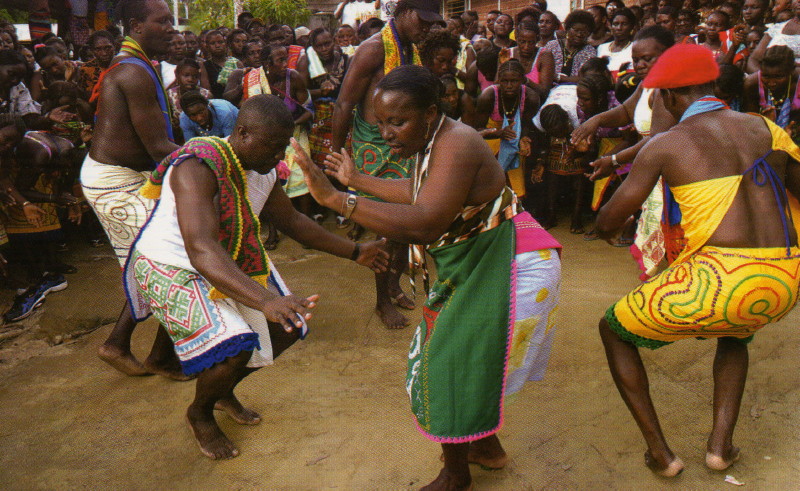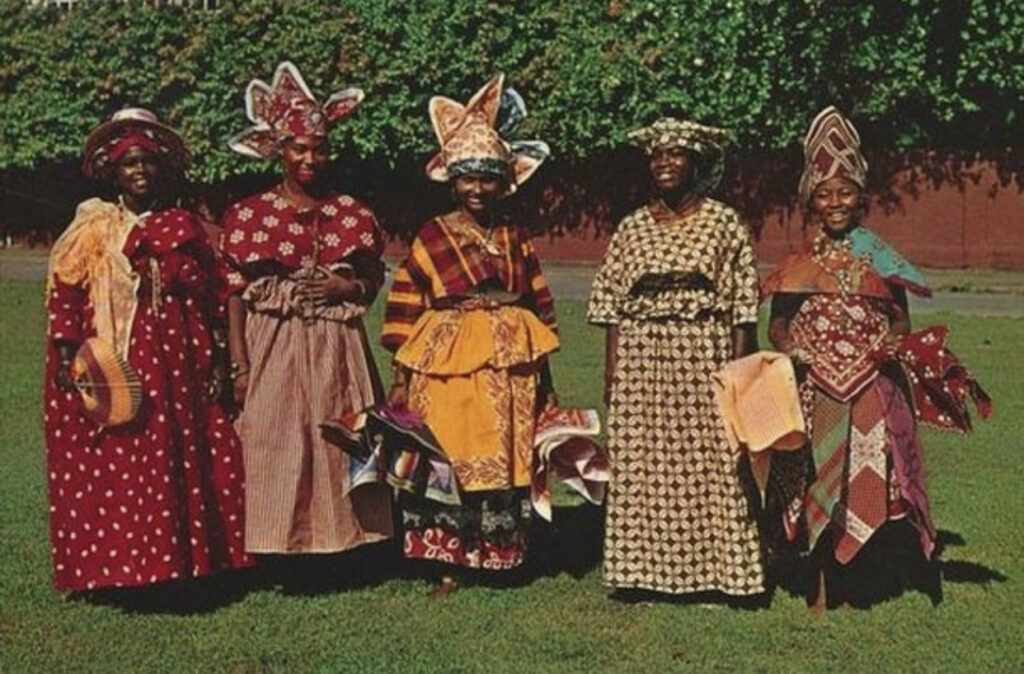Join us on a fascinating exploration of Afro-Surinamese Culture, where we invite you to immerse yourself in the rich traditions, history, and vibrant heritage of Suriname’s Afro-descendant population. From the captivating rhythms of traditional music to the delectable flavors of Creole cuisine, this article offers a captivating glimpse into the heart and soul of an often overlooked cultural gem. Whether you’re a history enthusiast or simply curious about diverse cultures, this deep dive into Afro-Surinamese Culture promises to be an enlightening and captivating journey.
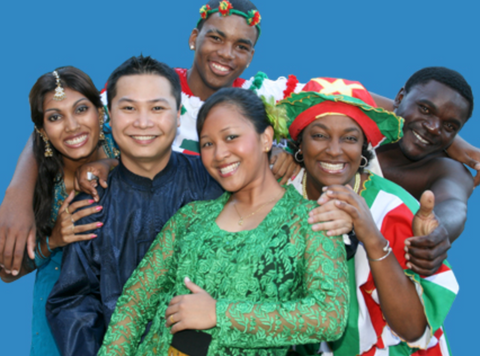
History of Afro-Surinamese Culture
Enslavement and Arrival in Suriname
The history of Afro-Surinamese culture is deeply intertwined with the legacy of slavery. Beginning in the 17th century, enslaved Africans were forcibly brought to Suriname by the Dutch, who colonized the region. These individuals came from diverse ethnic groups and brought with them rich cultural traditions and languages. The harsh conditions of slavery shaped much of their experience and contributed to the development of a unique Afro-Surinamese culture.
Maroon Communities and Resistance
Despite the oppressive system of slavery, many enslaved Africans in Suriname resisted their captors and sought freedom. Some escaped the plantations and established independent communities in the dense Surinamese rainforests. These communities, known as Maroons, developed their own languages, religions, and cultural practices. They fought against colonial authorities and maintained their freedom for centuries, playing a significant role in the preservation of African traditions in Suriname.
Creole Culture and Traditional Beliefs
Over time, a distinctive creole culture emerged among the Afro-Surinamese population. Creole languages like Surinamese Creole and Sranan Tongo emerged as a means of communication. These languages incorporated elements of African languages, Dutch, and other influences, creating a unique linguistic blend that remains vibrant today. Traditional beliefs and practices, such as Winti (an Afro-Surinamese religion) and ancestor worship, also persisted, serving as important cultural pillars for the community.
Language and Communication
Surinamese Creole
Surinamese Creole, also known as Sranan, is a widely spoken language among Afro-Surinamese communities. This creole language developed from the interactions between African slaves and European colonizers. Surinamese Creole combines elements of English, Dutch, Portuguese, and West African languages, creating a distinct linguistic identity. It serves as a means of cultural expression and connection, fostering a sense of belonging and solidarity among Afro-Surinamese individuals.
Sranan Tongo
Sranan Tongo is another prominent creole language spoken by Afro-Surinamese communities. It shares many similarities with Surinamese Creole but has its own unique characteristics. Sranan Tongo has been central to the preservation and transmission of Afro-Surinamese culture, as it is used in music, storytelling, and daily interactions. It acts as a powerful tool for cultural expression and plays a vital role in maintaining a sense of identity within the community.
Languages of Maroon Communities
In addition to Surinamese Creole and Sranan Tongo, Maroon communities have developed their own languages, known as Maroon languages. These languages incorporate elements of African languages, as well as Dutch and indigenous languages. The Maroon languages serve as a key aspect of cultural preservation, allowing the community to maintain a connection to their African roots and pass down ancestral knowledge to future generations.
Religion and Beliefs
Winti
Winti is a traditional Afro-Surinamese religion that blends African spiritual beliefs with elements of Christianity. Central to Winti is the belief in various spirits, known as Winti, that play a role in daily life and can influence human affairs. Practitioners of Winti engage in rituals and ceremonies to honor these spirits and seek their guidance and protection. Winti has served as a powerful force in the preservation of Afro-Surinamese cultural traditions, providing a spiritual foundation for the community.
Ancestor Worship
Ancestor worship is another important aspect of Afro-Surinamese religious beliefs. The ancestors are revered and seen as sources of wisdom and protection. Ancestral rituals and ceremonies are conducted to honor and communicate with the spirits of the deceased. This practice not only establishes a connection with past generations but also serves as a means of preserving cultural traditions and passing down knowledge and values.
Christianity in Afro-Surinamese Culture
Christianity also plays a significant role in Afro-Surinamese culture, particularly among those who descended from enslaved Africans of Christian backgrounds. Over time, Christianity became intertwined with traditional Afro-Surinamese beliefs, creating a unique blend of religious practices. Many Afro-Surinamese individuals maintain dual religious affiliations, incorporating elements of both Christianity and traditional beliefs into their daily lives.
Arts and Expressions
Music and Dance
Music and dance are integral parts of Afro-Surinamese culture, serving as vehicles for cultural expression and storytelling. Traditional musical genres such as kaseko and kawina have African roots and incorporate Afro-Surinamese languages and instruments. These rhythmic and lively musical styles are often accompanied by energetic dance movements, creating a vibrant and engaging experience. Music and dance play a central role in various celebrations and festivals within the Afro-Surinamese community.
Visual Arts and Crafts
Visual arts and crafts are also important forms of cultural expression among Afro-Surinamese communities. Traditional motifs and symbols are used to create intricate fabrics, woodcarvings, and pottery. These artistic creations often depict scenes from daily life and carry deep spiritual and cultural significance. They serve as tangible representations of Afro-Surinamese cultural heritage and are valued for their beauty and historical significance.
Storytelling and Oral Traditions
Storytelling and oral traditions are vital in preserving the history and cultural heritage of Afro-Surinamese communities. Through the generations, stories, proverbs, and folktales have been passed down, ensuring the continuity of knowledge, values, and traditions. These oral traditions not only entertain but also educate and transmit core aspects of Afro-Surinamese identity and worldview. They contribute to a strong sense of community and enable the preservation of cultural heritage.
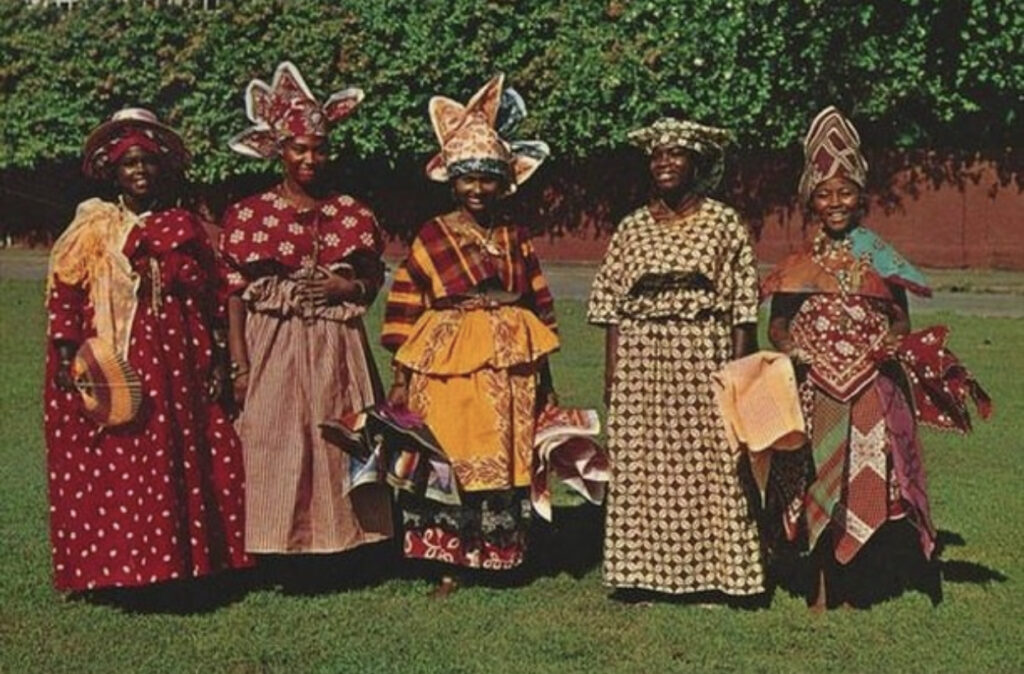
Cuisine and Traditional Dishes
Rice and Beans
Rice and beans, known as “nasi” in Suriname, are staple foods in Afro-Surinamese cuisine. This dish reflects the influence of African, European, and Asian culinary traditions, which have blended over centuries. Afro-Surinamese rice and beans are often prepared with aromatic spices, herbs, and flavorsome vegetables, creating a satisfying and hearty meal. This traditional dish is not only a source of nourishment but also a symbol of cultural fusion and heritage.
Pom
Pom is a popular Afro-Surinamese dish enjoyed on special occasions and celebrations. It is a flavorful casserole made with oven-baked chicken and root vegetables, such as pomtajer (taro) and citrus fruits. The dish has its origins in West African cuisine and has evolved over time to become a beloved Afro-Surinamese specialty. Pom’s unique combination of ingredients and delicious flavors captures the essence of Afro-Surinamese culinary traditions.
Okra Soup
Okra soup is a traditional Afro-Surinamese dish known for its rich flavors and nourishing qualities. Made with okra, leafy greens, and various meats or seafood, this hearty soup is a favorite among Afro-Surinamese communities. It reflects the influence of West African cooking techniques and ingredients. Okra soup is not only delicious but also represents the importance of communal dining and the sharing of meals within Afro-Surinamese culture.
Traditional Clothing and Adornments
Koto
The koto is a traditional Afro-Surinamese dress worn by women on special occasions, such as weddings and religious ceremonies. This vibrant and elegant garment consists of a colorful wrap skirt and a matching headscarf, often made from brightly patterned fabrics. The koto reflects the African influence on Afro-Surinamese culture and serves as a symbol of cultural identity and pride. Wearing the koto is a way for Afro-Surinamese women to celebrate their heritage and express their unique sense of style.
Angisa
Angisa, also known as a head wrap, is an important cultural adornment in Afro-Surinamese communities. The intricate folding and tying of the fabric create unique patterns and shapes, each with its own symbolic meaning. Angisa represents femininity, spirituality, and cultural heritage. It is worn by women of all ages and serves as a symbol of respect and identity within the Afro-Surinamese community.
Jaw String Decorations
Jaw string decorations, or jaw bones, are traditional ornaments worn by both men and women in Afro-Surinamese culture. These decorative strings, made from materials such as beads and shells, are worn around the neck, wrists, or ankles. Jaw string decorations carry spiritual significance and are believed to offer protection and good fortune. They are intricately designed and beautifully crafted, showcasing the artistic skills and cultural traditions of Afro-Surinamese communities.
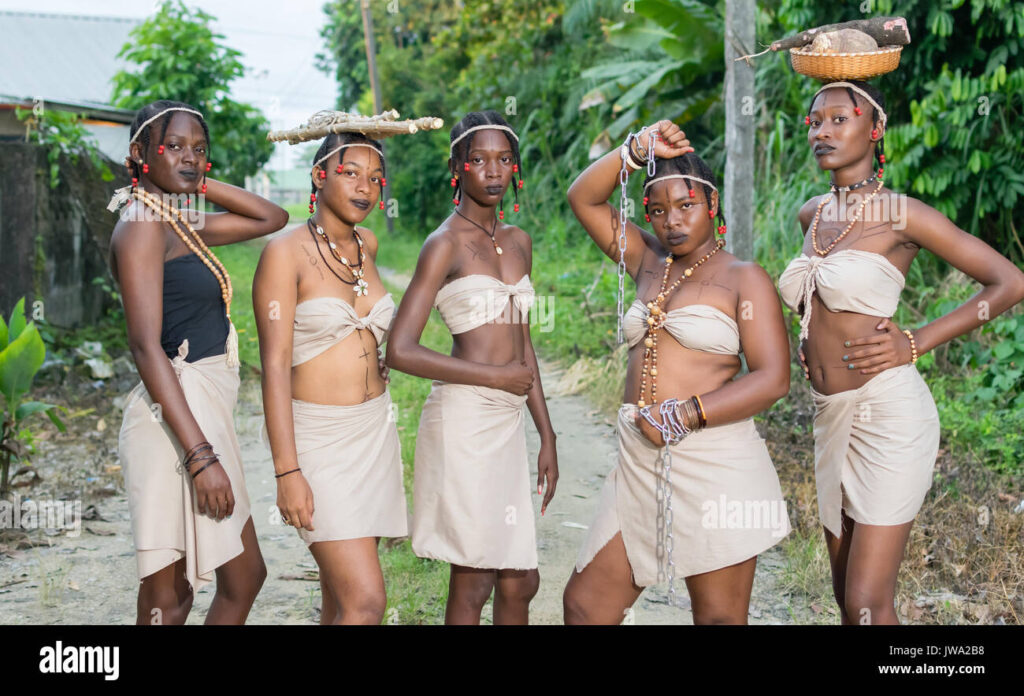
Celebrations and Festivals
Keti Koti (Emancipation Day)
Keti Koti, meaning “Breaking the Chains,” is an annual national holiday in Suriname commemorating the emancipation of enslaved Africans. Celebrated on July 1st, Keti Koti is a time for reflection, remembrance, and the celebration of freedom. The day is marked by various activities, including cultural performances, music, traditional food, and educational events. Keti Koti serves as a powerful reminder of the struggles and resilience of Afro-Surinamese ancestors and the ongoing fight for equality.
Asiki Pai (Cassava Festival)
The Asiki Pai festival, also known as the Cassava Festival, is a cultural celebration that showcases the importance of cassava in Afro-Surinamese cuisine and traditions. Cassava, a staple crop, is essential for the production of various Afro-Surinamese dishes, such as cassava bread and cassava cake. During the festival, communities come together to share traditional foods, engage in cultural performances, and participate in cassava-related activities. The Asiki Pai festival strengthens the connection to Afro-Surinamese culinary heritage and promotes community unity.
Djuka Day
Djuka Day, also known as Djoeka Dag, is an annual celebration that honors the contributions and cultural heritage of the Djuka Maroon community. The Djuka people, descendants of the Maroons, have a distinct linguistic, cultural, and historical identity within Afro-Surinamese culture. Djuka Day is marked by traditional dances, music, storytelling, and the showcasing of Djuka crafts and traditions. The celebration highlights the resilience and pride of the Djuka community and raises awareness of their unique cultural heritage.
Social Structure and Gender Roles
Matrifocal Families
Afro-Surinamese society is characterized by matrifocal families, where women play prominent roles as heads of households and caretakers. Matrifocality is deeply rooted in African cultural traditions, where women historically held positions of power and influence. In Afro-Surinamese communities, women often have significant decision-making authority and contribute to the social and economic well-being of their families. Matrifocal families embody resilience and female empowerment within Afro-Surinamese culture.
Matriarchs and Female Empowerment
Matriarchs, often older women within the family or community, hold respected positions of authority and wisdom in Afro-Surinamese culture. These female leaders provide guidance, support, and cultural knowledge to their families and communities. Matriarchs are seen as pillars of strength and embody the importance of maternal lineage, cultural preservation, and female empowerment within the Afro-Surinamese social structure.
Male Initiation Rites
In Afro-Surinamese culture, male initiation rites mark the transition from adolescence to adulthood for young men. These rites of passage are rooted in traditional African customs and serve as a way to impart cultural knowledge and values. Initiates undergo rituals, teachings, and tests to demonstrate their readiness to take on adult responsibilities. Male initiation rites reinforce male identity, community bonding, and the intergenerational transmission of cultural traditions.
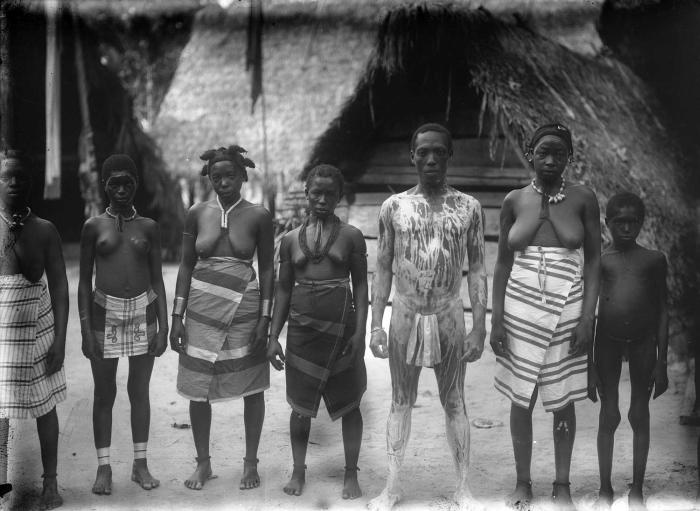
Cultural Preservation and Challenges
Identity and Heritage Preservation
Afro-Surinamese communities face ongoing challenges in preserving their cultural identity and heritage. Globalization, urbanization, and migration pose threats to traditional practices and ways of life. Efforts are being made to promote cultural education, historical research, and the documentation of oral traditions. Afro-Surinamese individuals and organizations are actively working to ensure the continuity and recognition of their cultural heritage, both within Suriname and on the international stage.
Language Endangerment
The languages of Afro-Surinamese communities, such as Surinamese Creole and Sranan Tongo, face the risk of endangerment. Increasing urbanization, migration, and the influence of global languages contribute to a declining number of speakers and a loss of language proficiency. Language preservation initiatives, including language classes and cultural events, aim to revitalize and maintain these distinctive language forms. The preservation of Afro-Surinamese languages is crucial for the preservation of cultural identity and cohesion.
Balance with Modernization
The Afro-Surinamese community faces the challenge of balancing cultural preservation with the demands of modernization and globalization. As Surinamese society evolves, traditional practices and values may come into conflict with contemporary lifestyles. Finding a balance between cultural heritage and the forces of change means embracing modern opportunities while safeguarding ancestral customs and traditions. Adaptive strategies, education, and community involvement are essential in navigating these challenges.
Tourism and Afro-Surinamese Culture
Heritage Tours
Heritage tours offer visitors the opportunity to experience the rich traditions and history of Afro-Surinamese culture. These tours often include visits to Maroon villages, cultural performances, storytelling sessions, and hands-on activities like cooking traditional dishes or learning traditional craft techniques. Heritage tours provide a platform for cultural exchange and promote a deeper understanding and appreciation of Afro-Surinamese traditions.
Cultural Experiences
Engaging in cultural experiences allows travelers to immerse themselves in Afro-Surinamese culture. Participating in traditional music and dance workshops, learning about the importance of adorning Angisa head wraps, or joining community celebrations and festivals offer a firsthand experience of the vibrancy and richness of Afro-Surinamese culture. Cultural experiences foster cross-cultural understanding, promote a sense of respect, and contribute to the preservation of Afro-Surinamese traditions.
Community-Based Tourism
Community-based tourism initiatives are gaining traction in Afro-Surinamese communities. These initiatives are driven by local residents and aim to empower the community and preserve cultural traditions. Visitors can stay in community-run guesthouses, participate in guided tours led by community members, and support local businesses and artisans. Community-based tourism provides economic opportunities for Afro-Surinamese communities and enables direct engagement with the cultural heritage of the region.
In conclusion, Afro-Surinamese culture is a testament to the resilience, creativity, and rich heritage of the descendants of enslaved Africans in Suriname. The history, language, religion, arts, cuisine, and social structures of Afro-Surinamese communities are integral to their sense of identity and provide a powerful testament to their unique cultural heritage. Efforts to preserve and celebrate Afro-Surinamese culture, while navigating the challenges of modernization, showcase a deep commitment to honoring the past while embracing the future. Afro-Surinamese culture invites us to explore and appreciate the richness of this vibrant community and its contributions to Surinamese society as a whole.
